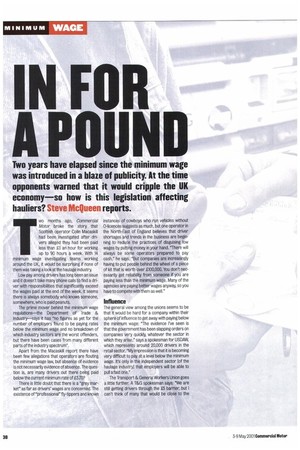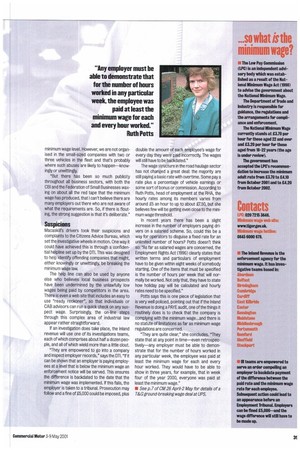11 FOR A P01111
Page 40

Page 41

If you've noticed an error in this article please click here to report it so we can fix it.
Two years have elapsed since the minimum wage was introduced in a blaze of publicity. At the time opponents warned that it would cripple the UK economy—so how is this legislation affecting hauliers? Steve McQueen reports.
T
we months ago, Commercial Motor broke the story that Scottish operator Colin Macaskill had been investigated after drivers alleged they had been paid less than £3 an hour for working up to 90 hours a week. With 14 minimum wage investigating teams working around the UK, it would be surprising if none of them was taking a look at the haulage industry.
Low pay among drivers has long been an issue and it doesn't take many phone calls to find a driver with responsibilities that significantly exceed the wages paid at the end of the week. It seems there is always somebody who knows someone, somewhere, who is paid peanuts.
The prime mover behind the minimum wage regulations—the Department of Trade & Industry—says it has "no figures as yet for the number of employers found to be paying rates below the minimum wage and no breakdown of which industry sectors are the worst offenders, but there have been cases from many different parts of the industry spectrum".
Apart from the Macaskill report there have been few allegations that operators are flouting the minimum wage law, but absence of evidence is not necessarily evidence of absence. The question is, are many drivers out there being paid below the current minimum rate of 83709 There is little doubt that there is a "grey market" as far as drivers' wages are concerned. The existence of "professional" fly-tippers and known instances of cowboys who run vehicles without 0-licences suggests as much, but one operator in the North-East of England believes that driver shortages and trends in the business are beginning to reduce the practices of disguising low wages by putting money in your hand. "There will always be some operators prepared to pay cash," he says. "But companies are increasingly having to put people behind the wheel of a piece of kit that is worth over £100,000. You don't necessarily get reliability from someone if you are paying less than the minimum wage. Many of the agencies are paying better wages anyway, so you have to compete with them as well."
Influence
The general view among the unions seems to be that it would be hard for a company within their sphere of influence to get away with paying below the minimum wage: "The evidence I've seen is that the government has been slapping orders on companies very quickly, whatever the sector in which they arise," says a spokesman for USDAW, which represents around 20,000 drivers in the retail sector. "My impression is that it is becoming very difficult to pay at a level below the minimum wage. It's only in the independent sector [of the haulage industry] that employers will be able to pull a fast one."
The Transport & General Workers Union goes a little further. A T&G spokesman says: "We are still getting drivers through the £5 barrier, but I can't think of many that would be close to the minimum wage level. However, we are not organised in the small-sized companies with two or three vehicles in the fleet and that's probably where such abuses are likely to happen—knowingly or unwittingly, But there has been so much publicity throughout all business sectors, with both the CBI and the Federation of Small Businesses waxing on about all the red tape that the minimum wage has produced, that I can't believe there are many employers out there who are not aware of what the requirements are. So, if there is flouting, the strong suggestion is that it's deliberate."
Suspicions
Macaskill's drivers took their suspicions and complaints to the Citizens Advice Bureau, which set the investigative wheels in motion. One way it could have achieved this is through a confidential helpline set up by the DTI. This was designed to help identify offending companies that might, either knowingly or unwittingly, be breaking the minimum wage law.
The help line can also be used by anyone else who believes local business prospects have been undermined by the unlawfully low wages being paid by competitors in the area. There is even a web site that includes an easy to use "ready reckoner", so that individuals cr CAB advisors can run a quick check on any suspect wage. Surprisingly, the on-line steps through this complex area of industrial law appear rather straightforward.
If an investigation does take place, the Inland revenue will use one of its investigations teams, each of which comprises about half a dozen people, and all of which wield more than a little clout.
"They are empowered to go into a company and inspect employer records," says the DTI. "Tit can be shown that an employer is paying employees at a level that is below the minimum wage an enforcement notice will be served. This ensures the difference is backdated to the date that the minimum wage was implemented. If this fails, the employer is taken to a tribunal. Prosecution may follow and a fine of £5,000 could be imposed, plus double the amount of each employee's wage for every day they were paid incorrectly. The wages will still have to be backdated."
The wage structure in the road haulage sector has not changed a great deal: the majority are still paying a basic rate with overtime. Some pay a rate plus a percentage of vehicle earnings or some sort of bonus or commission. According to Ruth Potts, head of employment at the RHA, the hourly rates among its members varies from around £5 an hour to up to about £7.50, but she believes few will be getting even close to the minimum wage threshold.
In recent years there has been a slight increase in the number of employers paying drivers on a salaried scheme. So, could this be a way for operators to disguise a fixed rate for an unlimited number of hours? Potts doesn't think so: "As far as salaried wages are concerned, the Employment Rights Act (1996) clearly states that written terms and particulars of employment have to be given within eight weeks of somebody starting. One of the items that must be specified is the number of hours per week that will normally be worked. Not only that, they have to state how holiday pay will be calculated and hourly rates need to be specified."
Potts says this is one piece of legislation that is very well policed, pointing out that if the Inland Revenue is doing a PAYE audit, one of the things it routinely does is to check that the company is complying with the minimum wage...and there is no statute of limitations as far as minimum wage regulations are concerned.
"They are quite clear," she concludes. "They state that at any point in time—even retrospectively—any employer must be able to demonstrate that for the number of hours worked in any particular week, the employee was paid at least the minimum wage for each and every hour worked. They would have to be able to show in three years, for example, that in week four of the year 2000, everyone was paid at least the minimum wage."
■ See p.7 of CM 26 April-2 May for details of a T&G ground-breaking wage deal at UPS.
































































































